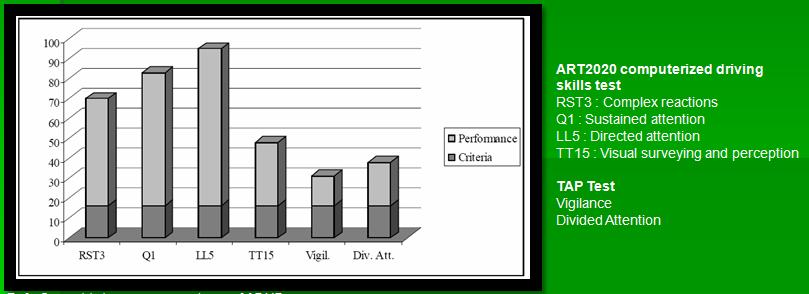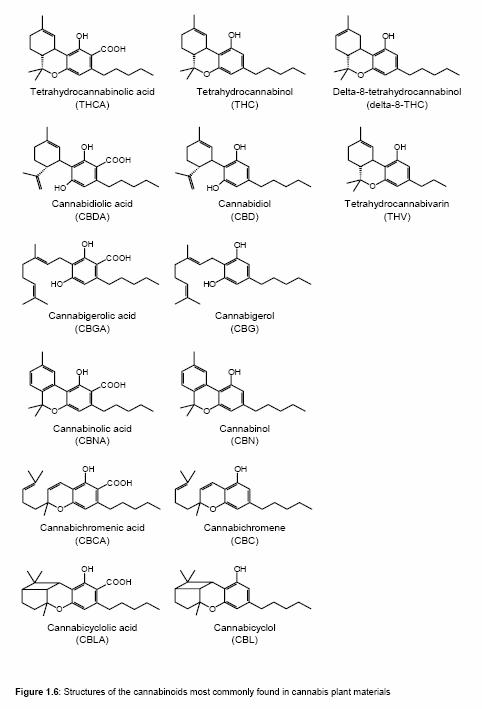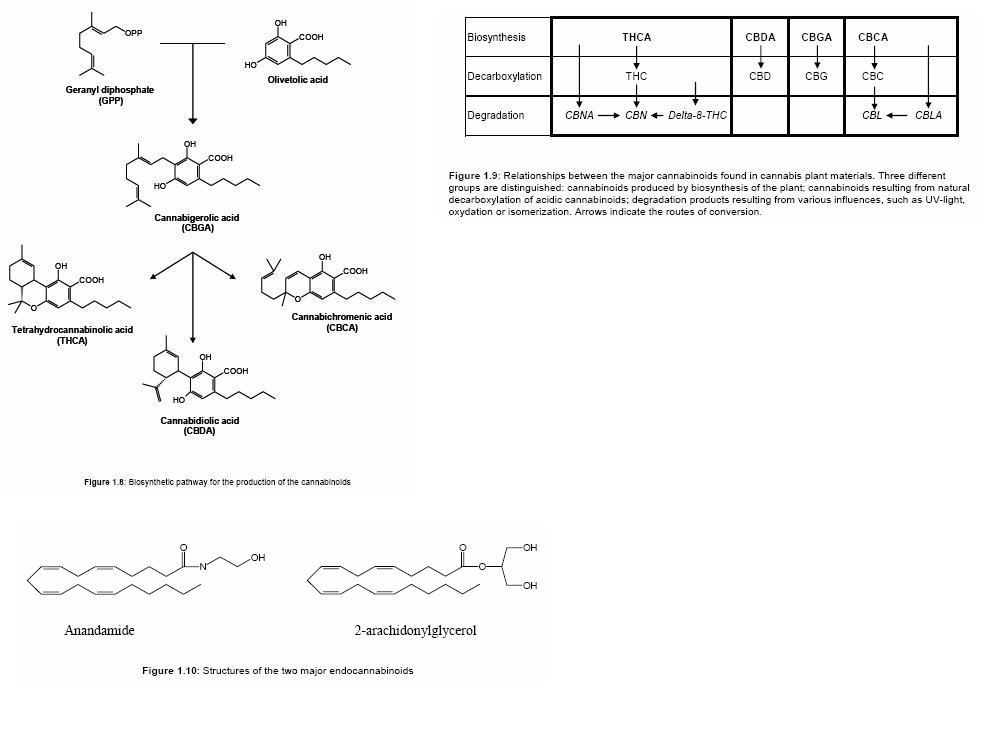ADHD, cannabis and cannabinoids
Scientific
References ... in evolution 
_______________________________________________________________________________________________________
Scientific References
- Cannabis effective in the treatment of Tourette Syndrome and attention deficit hyperactivity disorder (ADHD)
- Characteristics
Oral delta9-tetrahydrocannabinol improved refractory gilles de la
tourette syndrome in an adolescent by increasing intracortical
inhibition: a case report. J Clin Psychopharmacol 2010;30(2):190-2.
"German
scientists from the universities of Goettingen, Hamburg and Dresden
reported of the treatment of a 15-year-old boy with treatment
refractory Tourette Syndrome (TS) and attention deficit hyperactivity
disorder (ADHD) leading to severe physical and psychosocial impairment.
Administration of THC resulted in a considerable improvement of tics
without adverse effects, allowing parallel stimulant treatment of
comorbid ADHD. Along with THC treatment, intracortical inhibition, that
is inhibition of signal transmission between nerve cells in the cortex
of the brain, was increased."
- Co-occurence of cannabis use and ADHD :
- A placebo-controlled trial of atomoxetine in marijuana-dependent individuals with adhd
"At the Medical University of South Carolina in Charleston, USA, 38 patients with
attention deficit hyperactivity disorder (ADHD) and cannabis dependence were
treated either with atomoxetine or placebo for 12 weeks. Treated patients had
some improvement in a scale on clinical gobal impression. There were however no
effects on self-rated ADHD symptoms by patients and cannabis use."(Source Bulletin IACM / McRae-Clark AL, et al. Am J Addict 2010;19(6):481-9.)
- Characteristics and problems of 600 adolescent cannabis abusers in outpatient
treatment, Tims
FM, Dennis
ML, Hamilton
N, J
Buchan B, Diamond
G, Funk
R, Brantley
LB, Addiction. 2002
Dec;97 Suppl 1:46-57.
"The co-occurrence of conduct disorder and ADHD was found in 30% of the sample"
-
ADHD, genetic and CB1 implication :
- Association
of the Cannabinoid Receptor Gene (CNR1) with ADHD and post-traumatic
stress disorder PTSD, Lu and al., AM J Med Genet B Neuropsychiatr
Genet,
2008 Dec 5;147B(8):1488-94
"These
observations (...) suggest that the CNR1 (cannabinoid receptor gene)
gene may be a risk factor for ADHD and possibly PTSD, and that this
gene warrants further investigation for a role in neuropsychiatric
disorders"
-
Attention, Cannabis and
Driving Performances  :
:
- Cannabis
Improves Symptoms of ADHD, P. Strohbeck-Kuehner and al., Cannabinoids
2008;3(1):1-3
"the
effects of cannabinoids in [ADHD]
patients may be different from those in healthy users suggesting an
involvement of the central cannabinoid receptor systems in the
pathology of the [ADHD] disorder"

- Mental Health :
- Different psychological effects of cannabis
use in adolescences at genetic risk for schizophrenia and with ADHD
"...the
cannabis users in the ADHD group had similar, or possibly lower, mental
health scores than non-users."
- Depression :
- Treating
Depression with cannabinoids, K. Blass, Cannabinoids 2008;3(2):8-10
-
Anxiety :
- Action
of Relief Oriented Use of Marijuana by Teens, Bottorff JL and al., Substance Abuse Treatment, Prevention, and Policy 2009, 4:7
- Action
of Cannabidiol CBD on the anxiety and other effects produced by THC in
normal subjects, Zuardi and al., Psychopharmacology, 1982;76(3):245-250.
_______________________________________________________________________________________________________
Scientific
Publications Related to Dopamine and other neurotransmitters
- D2, but not D1, Dopamine
Receptor Agonists Potentiate Cannabinoid-Induced Sedation in Nonhuman
Primates
"...
The results may reflects an important link between dopamine and
cannabinoid system in primate brain, of relevance to the
pathophysiology of dopamine-related neuropsychiatric diseases"
- Cannabinoid CB1
receptor-mediated modulation of evoked dopamine release and of
adrenylyl cyclase activity in the human neocortex
"...
The knowledge of the modulatory effects of CB1 receptor agonists and
competitive antagonists/inverse agonists on dopaminergic
neurotransmission may help to detect targets for the treatment of
cognitive or movement disorders."
- Endocannabinoid
Signaling in Midbrain Dopamine Neurons: More Than Physiology?, Melis
et. al., Current Pharmacology, Vol 5 N°4 Dec 2007 268-277
"The
modulation of the endocannabinoid system by pharmacological agents is a
valuable target in protection of dopamine neurons against finctional
abnormalities as well as against neurodegenaration."
- Coexpression
of the Cannabinoid Receptor Type 1 (CB1) with Dopamine and Serotonin
Receptors in Distinct Neuronal Subpopulations of the Adult Mouse
Forebrain, Hermann H. et. al., Neuroscience Vol 109 Issue 3 Feb 2002
451-460
"... this suggests a potential of CB1 to modulate the function of the dopamine and serotonin system"
- Cannabinoids and Schizophrenia: Where is the Link? K Muller-vahl, Cannabinoids 2008;3(4):11-15
"Cannabidiol (CBD) is a major non-psychotic constituent of cannabis."
_______________________________________________________________________________________________________
Other Scientific Publications and Reviews
- The
mechanism of retrograde signaling : The Brain's own Marijuana :
Research into natural chemicals that mimic marijuana's effects in the
brain could help explain, and suggest treatments, for pain, anxiety,
eating disorders, phobias and other conditions, Roger A. Nicoll and
Bradley N. Alger
- Endocannabinoid
System and Synaptic Plasticity: Implications for the Emotional
Responses.
"...
endocannabinoid signaling could represent a potential therapeutical
tool in the treatment of both anxiety and depressive symptoms"
- Role
of Endocannabinoids in Synaptic Signaling, D. Piomelli and al.,
Physiol. Rev. vol 83 10171066
- Cannabinoid
Receptors in Microglia of the Central Nervous System : immune
Functional Relevance, Cabral and al, Journal of Leukocyte Biology, vol
78, Dec 2005
- Chronic
Microglial Activation and Excitotoxicity Secondary to Excessive Immune
Stimulation ; Possible Factors in Gulf War Synrdome and Autism,
Blaylock, Journal of American Physicians ans Surgeons, vol 9 (2) summer
2004
- Clinical
Endocannabinoid Deficiency (CECD) : Can this concept explain
therapeutic benefits of Cannabis in Migraine, Fibromyalgia, Irritable
Bowel Syndrome and other treatment-resistant conditions, E. Russo et.
al., Neuroendocrinology Letters Nos.1/2, Feb-Apr Vol. 25,2004
______________________________________________________________________________________________________
Studies on Animal Models
(mice/rats)
-
Reduced
anxiety-like behaviour induced by genetic and pharmacological
inhibition of the endocannabinoid-degrading enzyme fatty acid amide
hydrolase (FAAH) is mediated by CB1 receptors, Moreira and Al.,
Neuropharmacology 54 (2008) 141-150
- Modulation
of anxiety through blockage of anandamide hydrolysis, D Piomelli and
al., Mature Medecine, vol 9, N°1, Jan. 2003.
- The
Endogenous Cannabinoid System controls extinction of aversive memories,
G. Marsicano and al., NATURE,
Vol 418, Aug 2002
- Cannabinoid
CB1 Receptor Mediates Fear Exctinction via Habituation-Like Processes,
Kamprath and al., The Journal of Neuroscience, June 21, 2006,
26(25):6677-6686
- Enhancing
Cannabinoid Neurotransmission Augments the Extinction of Conditioned
Fear, Chhatwal and al., Neuropsychopharmacology (2005) 30, 516-524
- Facilitation
of Contextual Fear Memory Extinction and Anti-anxiogenic Effects of
AM404 and Cannabidiol CBD in Conditionned Rats, Bitencourt and al., 1st
Annual Satellite Symposium on the Cannabinoids.
- The
Spontaneously Hypertensive-rat (SRH) as an Animal Model of ADHD :
Evidence for Impulsive and non-impulsive Subpopulations, Adriani and
al., Neuroscience and Behavioral Reviews, vol 27, Issue 7, Nov 2003,
639-651 
- Cannabidiol
CBD, extracted from Cannabis Sativa, selectively inhibits inflammatory
hypermotility in mice, Capasso and al., British Journal of
Pharmacology, 2008 Jul, 154(5), 1001-8.
_______________________________________________________________________________________________________
Endocannabinoid
System Basics
- Endocannabinoid
System Network ECSN (USA)
_____________________________________________________________________________________________________
Cannabis
Phyto-cannabinoids Chemistry
- A
Tale of Two Cannabinoids: The Therapeutic rationale for combining
tetrahydrocannabinol (THC) and Cannabidiol (CBD), Russo E. et. al.,
Medical Hypotheses (2006) 66, 234-246
- Cannabis
and Cannabis Extracts: Greater Than The Sum of Their Parts?, Russo E.
et. al., Journal of Cannabis Therapeutics Vol.1 N° 3/4, 2001 103-132
- Extraction
the Medicine, Arnaud Hazekamp Thesis, 187p (Netherlands)
© 2008-2010 Mcforadhd


 :
:


